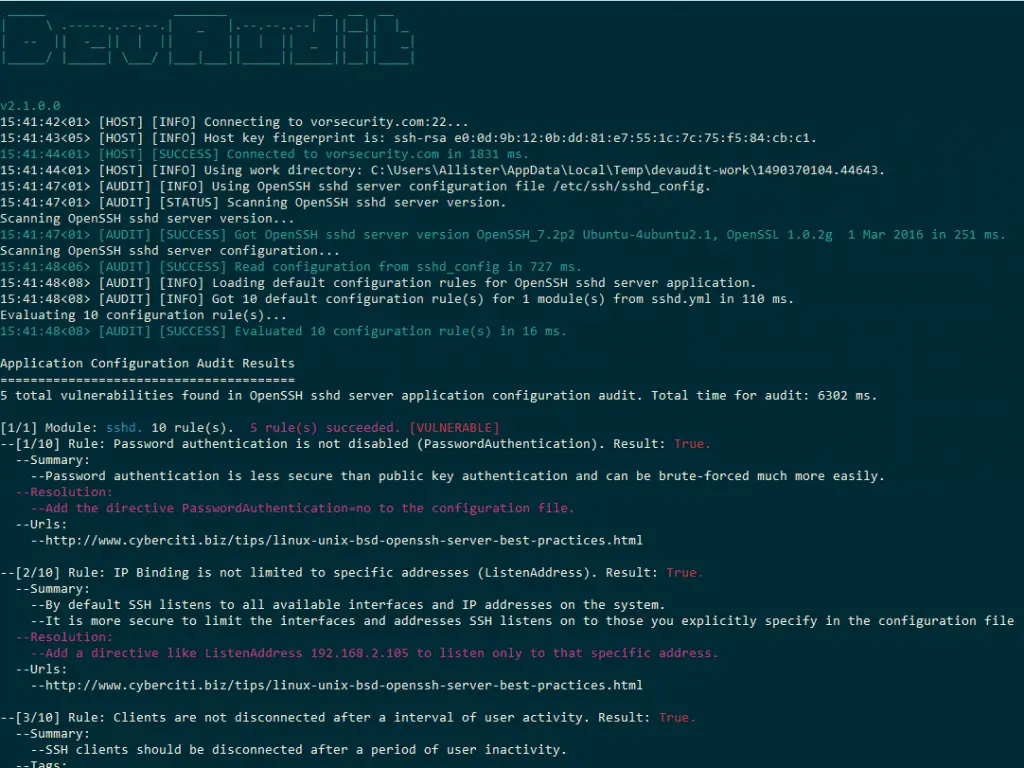
DevAudit: Development Auditing
DevAudit is an open-source, cross-platform, multi-purpose security auditing tool targeted at developers and teams adopting DevOps and DevSecOps that detects security vulnerabilities at multiple levels of the solution stack. DevAudit provides a wide array of auditing capabilities that automate security practices and implementation of security auditing in the software development life-cycle. It can scan your operating system and application package dependencies, application and application server configurations, and application code, for potential vulnerabilities based on data aggregated by providers like OSS Index and Vulners from a wide array of sources and data feeds such as the National Vulnerability Database (NVD) CVE data feed, the Debian Security Advisories data feed, Drupal Security Advisories, and many others.
DevAudit helps developers address at least 4 of the OWASP Top 10 risks to web application development:
- A9 Using Components with Known Vulnerabilities
- A5 Security Misconfiguration
- A6 Sensitive Data Exposure
- A2 Broken Authentication and Session Management
as well as risks classified by MITRE in the CWE dictionary such as CWE-2 Environment and CWE-200 Information Disclosure
As development progresses and its capabilities mature, DevAudit will be able to address the other risks on the OWASP Top 10 and CWE lists like Injection and XSS. With the focus on web and cloud and distributed multi-user applications, software development today is increasingly a complex affair with security issues and potential vulnerabilities arising at all levels of the stack developers rely on to deliver applications. The goal of DevAudit is to provide a platform for automating the implementation of development security reviews and best practices at all levels of the solution stack from library package dependencies to application and server configuration to the source code.
Features
- Cross-platform with a Docker image also available. DevAudit runs on Windows and Linux with *BSD and Mac and ARM Linux support planned. Only an up-to-date version of .NET or Mono is required to run DevAudit. A DevAudit Docker image can also be pulled from Docker Hub and run without the need to install Mono.
- CLI interface. DevAudit has a CLI interface with an option for non-interactive output and can be easily integrated into CI build pipelines or as post-build command-line tasks in developer IDEs. Work on integration of the core audit library into IDE GUIs has already begun with the Audit.Net Visual Studio extension.
- Continuously updated vulnerabilities data. DevAudit uses backend data providers like OSS Index and Vulners which provide continuously updated vulnerabilities data compiled from a wide range of security data feeds and sources such as the NVD CVE feeds, Drupal Security Advisories, and so on. Support for additional vulnerability and package data providers like vFeed and Libraries.io will be added.
- Audit operating system and development package dependencies. DevAudit audits Windows applications and packages installed via Windows MSI, Chocolatey, and OneGet, as well as Debian, Ubuntu, and CentOS Linux packages installed via dpkg, RPM, and YUM, for vulnerabilities reported for specific versions of the applications and packages. For development package dependencies and libraries, DevAudit audits NuGet v2 dependencies for .NET, Yarn/NPM and Bower dependencies for nodejs, and Composer package dependencies for PHP. Support for other package managers for different languages is added regularly.
- Audit application server configurations. DevAudit audits the server version and the server configuration for the OpenSSH sshd, Apache httpd, MySQL/MariaDB, PostgreSQL, and Nginx servers with many more coming. Configuration auditing is based on the Alpheus library and is done using a full syntactic analysis of the server configuration files. Server configuration rules are stored in YAML text files and can be customized to the needs of developers. Support for many more servers and applications and types of analysis like database auditing is added regularly.
- Audit application configurations. DevAudit audits Microsoft ASP.NET applications and detects vulnerabilities present in the application configuration. Application configuration rules are stored in YAML text files and can be customized to the needs of developers. Application configuration auditing for applications like Drupal and WordPress and DNN CMS is coming.
- Audit application code by static analysis. DevAudit currently supports static analysis of .NET CIL bytecode. Analyzers reside in external script files and can be fully customized based on the needs of the developer. Support for C# source code analysis via Roslyn, PHP7 source code and many more languages and external static code analysis tools is coming.
- Remote agentless auditing. DevAudit can connect to remote hosts via SSH with identical auditing features available in remote environments as in local environments. Only a valid SSH login is required to audit remote hosts and DevAudit running on Windows can connect to and audit Linux hosts over SSH. On Windows, DevAudit can also remotely connect to and audit other Windows machines using WinRM.
- Agentless Docker container auditing. DevAudit can audit running Docker containers from the Docker host with identical features available in container environments as in local environments.
- GitHub repository auditing. DevAudit can connect directly to a project repository hosted on GitHub and perform package source and application configuration auditing.
- PowerShell support. DevAudit can also be run inside the PowerShell system administration environment as cmdlets. Work on PowerShell support is paused at present but will resume in the near future with support for cross-platform Powershell both on Windows and Linux.
Changelog
v3.4
-
At long last a new release. This release has a number of fixes and improvements that have been collecting over time, but did not get a proper release!
This release is an attempt to catch up so that new features can be merged and released at a much more reasonable pace.
Copyright (c) 2015, OSSIndex
All rights reserved.